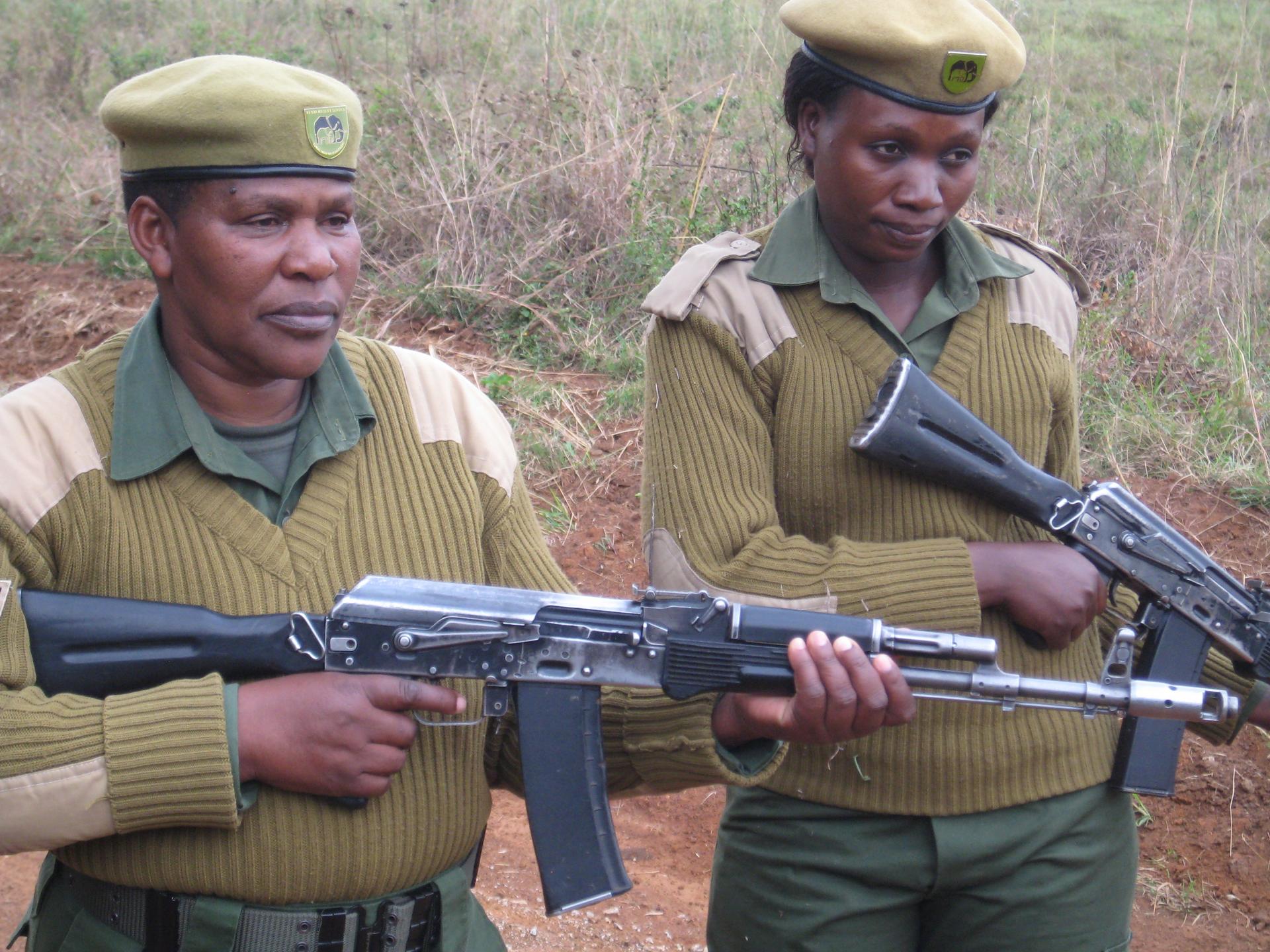Rangers in Kenya are outgunned in the new poaching arms race
Corporal Patricia Mututu (left), a 30-year Kenya Wildlife Service veteran, and Ranger Mildred Oduor on patrol in Nairobi National Park. Hundreds of Kenya Wildlife Service rangers have been shot by poachers in the last three years; 13 have been killed.
Outside of Kenya Wildlife Service headquarters in Nairobi, there's a stone monument that is paved in long brass plaques. The plaques list the names of park rangers killed on the job.
Ranger Florence Abae, shot by poachers on March 2, 2012, along with Ranger Francis Ochieng. Sergeant Bake Adan, ambushed three weeks before.
There are more than 60 names listed.
The "conservation heroes monument" looks like a war memorial. In many ways, it is.
As poaching decimates Africa's elephant and rhino populations – thousands killed in the past year alone – it's increasingly taken human casualties, on both sides of the fight.
“Sometimes we lose our rangers,” says Paul Mbugua, a spokesman for Kenya’s Wildlife Service. “This year we have already lost two of them – and sometimes poachers also lose their life.”
A 21-year veteran in military fatigues, Mbugua says in the past three years, poachers have shot hundreds of park rangers. Thirteen have died.
In the old days, small-time poachers carried pistols and came on foot. But a boom market in banned wildlife products has attracted major players, and better-equipped, more violent hit men.
“They are coming with heavier caliber firearms than previously. A rhino or an elephant simply requires one bullet and it's down,” Mbugua says.
It's not just bigger guns. Poachers now have motorcycles, sometimes helicopters; mobile phones, GPS with waypoints to track animals, even night vision. And rangers are in their direct line of fire.
“Their first reaction is to shoot you to kill you, not to scare you off,” says Mbugua. “So if you are the one holding the gun, what would you do? Become a good guy and go and meet your maker, or you shoot back to save yourself?”
Corporal Patricia Mututu, who’s been a park ranger for 30 years, has the answer: “I will kill the poacher, you know, I will not let the poacher kill me first.”
Mututu and ranger Mildred Oduor patrol Nairobi National Park, where a white rhino was shot August 10th, the first case of poaching here in six years. Since then, they've been on high alert.
“We are intensifying our patrols day and night, and we have rangers literally camping inside the park along the trails,” says Oduor.
Armed with AK-101 assault rifles, they're showing me how they follow tracks in the red dirt, looking for signs of trouble.
“Buffalo,” they tell me. From the tracks, it looks like the buffalo is long gone. But then we spot it, just down the road.
“Can you run fast?” Oduor says. “You don't have to be scared!”
I'm not really scared, until Oduor takes a dive into the bushes and raises her gun. It turns out this is just a demonstration.
“That is the work of the ranger, yeah?” they say, laughing.
Their point is, being a ranger in a park full of buffalo and lions was already a dangerous job. Now poaching has made it much more so.
Oduor knows the danger personally. Her childhood friend, and fellow ranger, David Odundo, was killed by poachers this summer.
“We used to know each other, exchange ideas, and then one day he was gone,” she says. “He was shot by poachers when they were on a night patrol. They were exchanging fire. He was badly shot.”
Rangers like David Odundo die fighting for one elephant, or one rhino. But Paul Mbugua of Kenya Wildlife Service says individual poachers are only the first link in an international chain.
“We only get the poachers, and those are the small guys,” he says. The black market in ivory and rhino horn is big business – an estimated $10 billion a year.
“Who has this kind of money?” he says. “The leading cartel that we know worldwide is drugs. Number two, comes human trafficking, and number three comes wildlife trophy trade.”
Conservation NGOs say criminal interests from Asian mafias to Islamist militants may have their fingers in the pot. One report claims the Somali Islamic militant group al-Shabab gets up to 40 percent of its financing from ivory.
This summer, Kenya formed what it calls an elite inter-agency anti-poaching unit – basically rangers and police working together to fight wildlife crime. This year alone, Kenya has lost more than 200 elephants and 35 rhinos.
Legislation before Kenya's parliament calls for much tougher punishments for poaching. But for now, Kenya Wildlife Service's main weapon against poaching is its rangers. So it's put out a call for 600 new, brave recruits.
